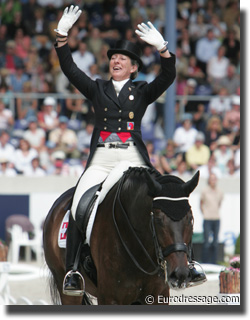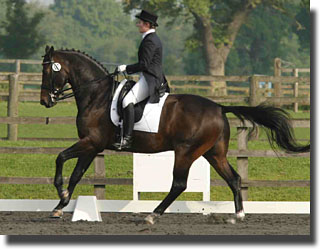|
Sport Psychology
Sport Psychology for Dressage: Staying Motivated
by Seana Adamson, Ph.D. - 29 January 2009
 Question: I do really well with the pressure of competition, but I struggle staying motivated in my daily training. Any suggestions? Question: I do really well with the pressure of competition, but I struggle staying motivated in my daily training. Any suggestions?
Answer: I have two different approaches I would like you to consider. The first is practical, and the second is personal. First let’s get practical.
If competition is what motivates you, then use competition to help you plan your daily schedule. For many people it is very motivating to have a clear goal for each day. Remember it is the training that occurs months before a show that determines much of your success in the show ring. Three day event riders are masters at writing training schedules. Because they have to fit dressage, jumping and conditioning into their horse’s schedules, they must be very organized. You do not need to be as specific as an event rider, but it still helps to have a well formed idea of what needs to happen NOW so that you can do it in the show ring 2 months from now. Here are some specific ideas of how you can plan your training schedule:
- Keep some kind of a journal or record of what works well, and what inspires you.
- At the foundation of your training you must try to balance the amount of stress you put on your horse (and yourself), with the amount of “recovery” time you allow for. If we put a horse under too much stress by training too hard, too many days in a row, then we risk doing physical or mental damage. Yet if we have too many “recovery” days (days off, light relaxation work, hacking out at the walk…) then the horse’s training doesn’t progress quickly enough. Examine the balance of stress and recovery in your daily training. Buckle down in the arena when it is appropriate, but do not feel guilty about taking easy days too.
- Have a long term plan as well as a short term plan. When you have to teach your horse a new skill, such as a pirouette or flying change, try to figure out how long you want to be training that skill before you show it in competition. Certain movements such as piaffe and passage may require years of careful work to develop.
- It is important to make a plan, but you do not have to follow the plan blindly. Have an idea of what you want, but be flexible and respond to the needs of your horse and yourself.
- The last two weeks before a competition are very important. Figure out what works best for your horse. My current Grand Prix horse does his best work when I have ridden a lot of repetitive movements in the dressage arena for the last two weeks before a show. I have an older, quieter horse that would be utterly bored with that schedule. He stays fresher by going out for a hack. Consider what your horse needs (we’ll get to your needs in a moment…). Use this to motivate a direction for your daily training.
- Get as much training as you can. Get a lesson from a favorite instructor, watch a new clinician teach, or even watch a dressage video. Ride with a friend, or have a friend watch you ride. Imagine Klaus Balkenhal is watching you ride.
Okay, enough of the practical, let’s get personal! If you do not feel motivated by journaling and scheduling, then here are a few more ideas to consider.
 The intense focus of competition can help boost your performance to a new level. When we are totally focused, in the moment, energized yet calm, there are few experiences more rewarding. Yet this level of intensity cannot be sustained indefinitely. As rewarding as it is, it is still a stress state. The intensity of competition is very stressful to retain over long periods of time. It is really important to have both mental and physical “recovery time”. The intense focus of competition can help boost your performance to a new level. When we are totally focused, in the moment, energized yet calm, there are few experiences more rewarding. Yet this level of intensity cannot be sustained indefinitely. As rewarding as it is, it is still a stress state. The intensity of competition is very stressful to retain over long periods of time. It is really important to have both mental and physical “recovery time”.
Sometimes it is really appropriate to take time off, go out for a hack, or do some type of cross training. But sometimes we have to force ourselves to work hard, even when we don’t feel like it. If you are motivated by competition, then think about what your competitors are doing. Imagine seeing the judge’s scores. Try to think of one thing you can work on each day that might make a difference in your score. For example a square halt.
Balance in our horse world is almost always related to balance in the rest of our world. Are there other aspects of your life that are affecting your ability to find your daily focus? Here are a few more questions to consider.
- What role do horses play in your life? Are you a professional trying to develop a reputation, or are you the mother of small children, trying to run a household?
- Are you spread too thin? Do you need more down time?
- Are you bored, and wishing for a life with more intensity?
- Do you need some new input or inspiration?
- Do you need to do something new and fresh in some other aspect of your life?
- Most importantly, are you having fun? Do you enjoy your horse?
Good luck, I hope this gives you some new ideas to work with. If you have any more questions you can contact me at seanaadams@aol.com
Related Links
Sport Psychology for Dressage
Performance Anxiety
|
